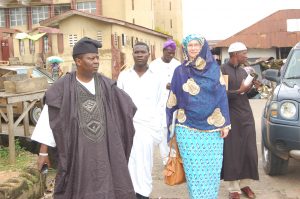Finally, the federal government announced that they would be introducing the use of native Nigerian languages in the delivery of Maths and Science education. When the Minister for education first made a policy statement on the decision I wrote about it here. Since then nothing much has been heard on the matter until recently when the chairman of the committee in charge of the project announced that they are going to commence the implementation of the policy very soon. The committee’s chairman went further to announce that textbooks have been produced for the purpose. Unfortunately, nothing was said on issues that relate to transition from being taught in native Nigerian languages and having to undergo undergraduate education in English language in the country.
The news report also signifies the typical top-down approach in the Nigerian education sector when it comes to policy decision making and implementation. In the report nothing was mentioned of the key stakeholders that were engaged in the process of the decision making and the planned implementation. More importantly, there seems to be no provision that has been made for teachers’ training on the use of any native Nigerian language as medium for classroom teaching and learning in the country’s compulsory education sector and language of teaching transition at higher education level. Likewise, no clear provision has been shown to have been provided for those that might not go beyond the compulsory education level.
There is also the potential of language hegemony among ethnic groups in the country. An example is the recent Yoruba language policy of the Lagos state government. A policy that makes it mandatory for all schools within the state to set aside a day on a weekly basis, within the state’s school calendar, as a Yoruba only day and all lessons are expected to be delivered in Yoruba language. Furthermore, the teaching of the language has been made mandatory by the state government. As someone that went to school in neighbourhoods that were of diverse cultures and ethnicities in Lagos, I find it very disturbing that the government would consider introducing such a law in the state without due consideration to the cosmopolitan and diverse nature of the state’s resident
While some of the proponents of a radical approach to bilingual education in Nigeria may suggest that developed countries like Germany, South Korea and China make use of their native languages to educate their people, as highlighted in this Daily Trust’s article; the reality is that in those countries they usually have one major native language they use unlike the case of the multiple major native languages with significant number of native speakers that Nigeria has. For instance, out of the said 18 Million residents of Lagos state, there are communities in which the predominant native language of the residents is not Yoruba language.
There is also the case that Nigeria runs a federal system of governance, hence, each state is has the liberty to decide how it implements its bilingual education policy. However, what type of bilingual education would the Lagos state government implement on native communities like the Ogu people whose language is obviously different from Yoruba language. Likewise, the Aworis, with claims from people like the Oba of Lagos that the Aworis are not Yorubas; as reported in the press. So, my concern is – why would the government want to impose a particular native Nigerian language on local residents and disrupt the lovely tradition of inclusiveness of all cultures and ethnicities that Lagos state and its people have been known for historically?
Perhaps, the present Lagos state government can look into its own history of how it had embraced the cultural and language diversities in the state in the past, through the use of the electronic media. There was the introduction of the Ogu news section in the ‘80s and also there were TV programs on the state’s official TV station that were delivered in some of the major Nigerian languages like Hausa and Igbo. Maybe the government needs to look into such provisions again for the promotion and preservation of the state’s history of inclusion, even though it has never been perfect as epitomised by the political plight of the Ogu people in the state.
In a recently published World Bank report on the state of public education in Africa titled “Facing Forward: Schooling for Learning in Africa (p.163)” (PDF), it was reported that “Ethiopian and Tanzania children, for example, do relatively better in the reading task…”. Both countries teach in their local languages in the early grades and spend more time at primary level delivering education in their local languages than most countries in Sub-Saharan Africa. Unfortunately, it is quite bemusing to note that there seems to be a complete lack of awareness of the bilingual education provision in the Nigeria’s national policy on education of 2013, which is similar to that of Tanzania as reported in the World Bank’s report. The Nigeria’s policy document provides a bilingual education policy that allows the use of the predominant local language in any community for the delivery of formal education up to the end of primary three, with the introduction of English language as the medium of teaching in classrooms from the beginning of the same year.
Astonishingly, I have not come across any press briefing by any of the policy makers on the issue that any direct reference was made to the bilingual education provision of the 2013 policy. Rather, the policy makers have been making policy statements and decisions that seem to be in direct contrast to the policy’s provision.
Finally, I have chosen not to reiterate some points on the issue of bilingual education in Nigeria in this article because I had written about them in these articles:
Beyond sentiments: issues with the bilingual education proposal by the Nigerian government
Between language, literacy and reading: the metaphor of the Nigerian parrot
Please, as you’re here, support my work by participating in my survey on home-based early years’ literacy practice among families in Nigeria, and remember to share the links with your contacts.
You can click on the link “Early literacy practices before beginning primary school (Home-based involvement)” to go there. Thanks.




